May 21, 2025 | 10:20 GMT +7
May 21, 2025 | 10:20 GMT +7
Hotline: 0913.378.918
May 21, 2025 | 10:20 GMT +7
Hotline: 0913.378.918
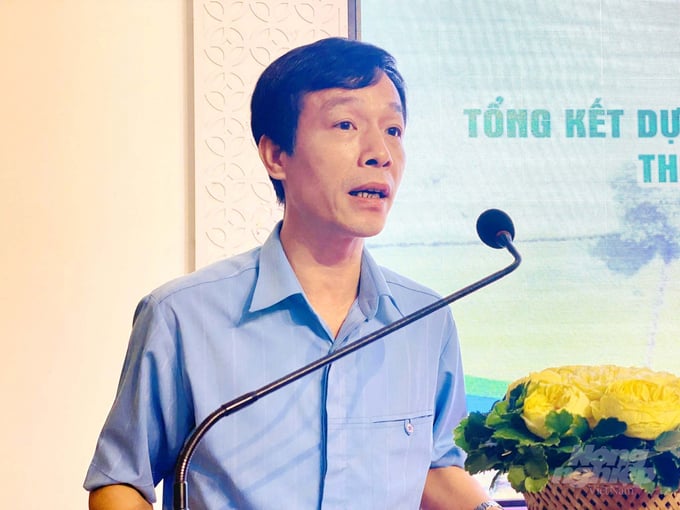
Mr. Vu Van Tien, Deputy Director of Department of Economic Cooperation and Rural Development under MARD giving a speech at the workshop. Photo: Le Hoang Vu.
The Department of Economic Cooperation and Rural Development under the Ministry of Agriculture and Rural Development in collaboration with the German Development Cooperation Organization (GIZ) held a workshop on September 21, in Can Tho city to review the Market-oriented Smallholder Value Chains Project (MSVC) and the Better Rice Initiative Asia phase II (BRIA 2).
The project has helped over 10,000 smallholder farmers in the Mekong Delta improve their farming processes as well as boost rice quality by participating in the Market-oriented Smallholder Value Chains Project. The project will be implemented from 2018 to 2022 in the provinces of An Giang, Dong Thap, Bac Lieu and Can Tho city. MSVC is a new initiative and a joint effort of Olam Agri, German Development Cooperation (GIZ) and the Ministry of Agriculture and Rural Development.
After 4 years of project implementation, 150,000 tons of international standard rice have been produced, opening up new growth opportunities for Vietnam's rice exports in markets such as the Europe and the US. Most of the smallholder farmers participating in the project have recorded an increase of at least 50% in rating against the Sustainable Rice Production Standard (SRP), the world's first voluntary sustainability standard for rice production. In addition, some farmers participating in the project's demonstration model have reduced water use by up to 40% and NPK fertilizers by up to 15% when switching from traditional continuous flood irrigation to alternating dry flooding and drip irrigation techniques.
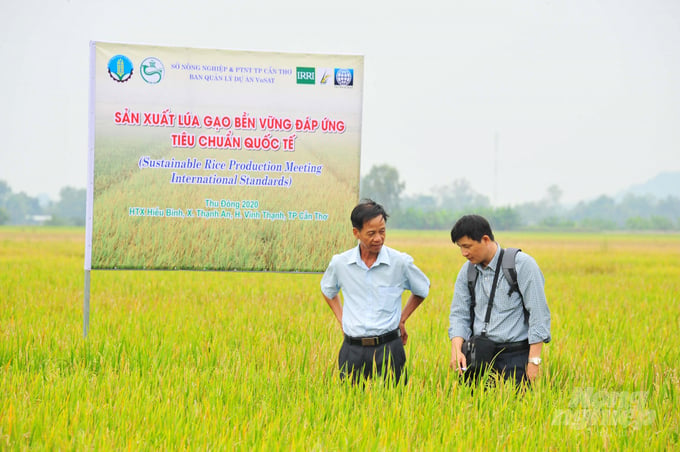
The MSVC project has helped over 10,000 smallholder farmers in the Mekong Delta improve their farming practices and boost rice quality. Photo: Le Hoang Vu.
Ms. Nguyen Thi Nhi, a farmer who is growing 5 hectares of rice in Tan Tien commune, Tri Ton district, An Giang reported that: Before she participated in the MSVC project, she kept fertilizing and spraying chemical pesticides indiscriminately during the rice production process, which resulted in high costs but ultimately low productivity. When she joined the MSVC project, the family's rice production started to save on costs as well as apply machines and advanced scientific and technical advances to production. Firstly, they reduced the amount of seeds sown, fertilizers used, and so on; thereby protecting the environment and health for everyone, including the families of rice growers. The rice production is highly productive and the rice quality is also excellent. Many farmers from surrounding areas also quickly followed along, helping to change the mindset and production of rice in the direction of sustainability and boldly applying science and technology to production to increase productivity as well as the value of rice grains.
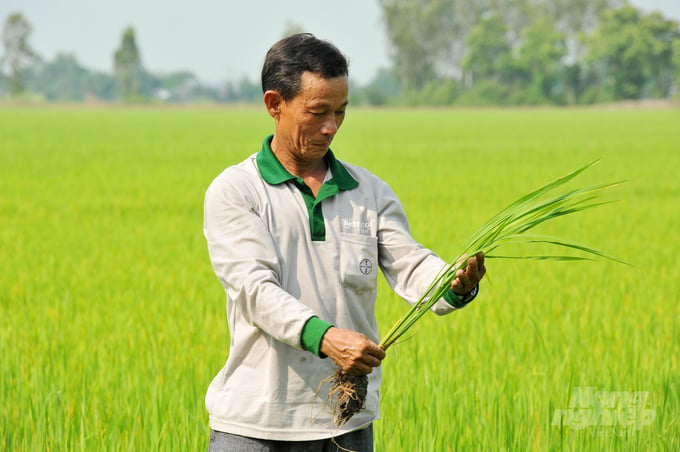
Farmers in Can Tho City produce rice according to SRP standards, helping to increase their income and secure their output because there are businesses who committed to consuming the output. Photo: Le Hoang Vu.
At Vinh Cuong Agricultural Cooperative in Hoa Binh district, Bac Lieu, Mr. Trinh Van Cuong, director of the cooperative shared that: Following the rice production according to SRP standards that the MSVC project has implemented for farmers in the cooperative for many years, has brought many economic, environmental and health benefits. The cooperative currently has more than 8,000 hectares of rice production and their output is fully covered by businesses, so farmers are assured of future production.
According to Ms. Huynh Dao Nguyen, Director of An Giang Agricultural Extension Center, SRP helps farmers cultivate rice more sustainably through reducing varieties, reducing nitrogen fertilizers, saving water, managing pests following the IPM system, managing pesticide residues and protecting the environment, thereby helping to reduce costs by 15 to 20% compared to traditional farming methods. As a result, the quality of rice grains has been improved for export to demanding markets such as the US, EU, etc. Furthermore, SRP also pays special attention to workers' rights with the focus on protection of women and children. Children are not allowed to participate in heavy, dangerous and toxic jobs; and children must be allowed to attend schools.
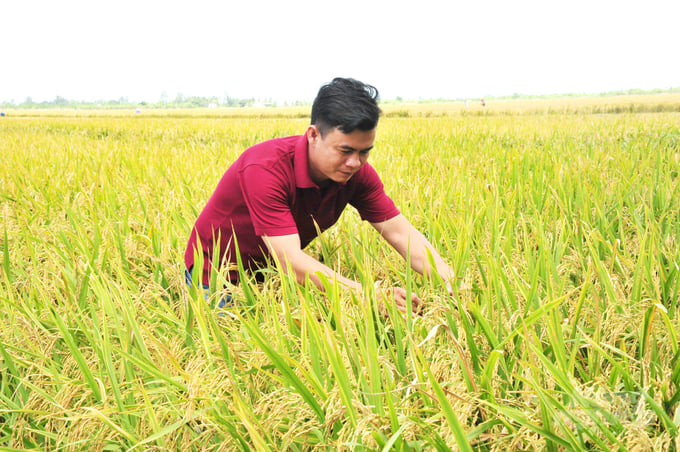
The Ministry of Agriculture and Rural Development wants to expand the MSVC project to many provinces in the Mekong Delta and the entire country afterwards. Photo: Le Hoang Vu.
Paul Nicholson, Deputy Director of Rice Research and Sustainability at Olam Agri, said: “Sustainable rice production benefits farmers, communities and consumers, while providing nutrition for 97 million Vietnamese people. This is in line with Vietnam's goal of transforming agriculture towards a more sustainable future. Olam Agri is working closely with its partners to improve the quality of rice produced in Vietnam and improve the livelihoods of Vietnamese farmers by strengthening links with global value chains and markets with high demand for safe, high-quality rice and responsible production.
Olam Agri is one of the largest rice trading groups in the world and the company has always been a strong supporter of sustainable rice farming. Within the framework of the MSVC project, Olam Agri has implemented activities to encourage farmers to produce and create market links between cooperatives and millers so rice can be bought directly from farmers in the Mekong Delta. With expertise and practical knowledge in effective farming practices, Olam Agri will produce and package SRP-labelled rice from SRP-certified farms in the Mekong Delta.
In addition to various partners' efforts in developing a comprehensive set of solutions from improving farming techniques to accessing markets, including developing farmers' capacity, SRP organizations ensure the Sustainability standards are followed with regards to improving the quality and value of agricultural products. Mr. Vu Van Tien, Deputy Director of the Department of Economic Cooperation and Rural Development commented: The successes and lessons learned from this project will help support state management agencies across all levels in the process of directing, formulating and adjusting policies to promote the development of linkages in the production and consumption of agricultural products throughout the country.
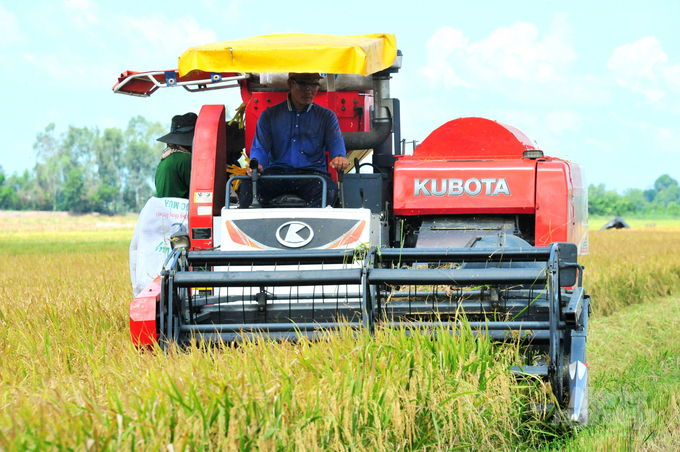
Many farmers in the Mekong Delta are happy because participating in rice production under SRP helps to reduce costs by 15 to 20%. Photo: Le Hoang Vu.
The project has contributed to improving the rice production chain in the Mekong Delta, thereby creating a Vietnamese rice brand that can compete in fastidious markets such as Europe, the US and Japan. After 4 years of implementing the MSVC project, the importance and effectiveness of the project in sustainable rice production has urged the Ministry of Agriculture and Rural Development to expand to many provinces in the Mekong Delta and the entire country afterwards.
In this public-private partnership, Olam and GIZ collaborated with central and local government agencies, cooperatives, cooperative groups, suppliers, certification experts and farmers in the implementation of project activities. This coordination helps the project ensure consistency in capacity building support for actors in the value chain. It is expected that the actors in the rice value chain in the Mekong Delta will continue to promote and multiply rice cultivation according to SRP standards, aiming to provide high quality rice to consumers and added value for rice production.
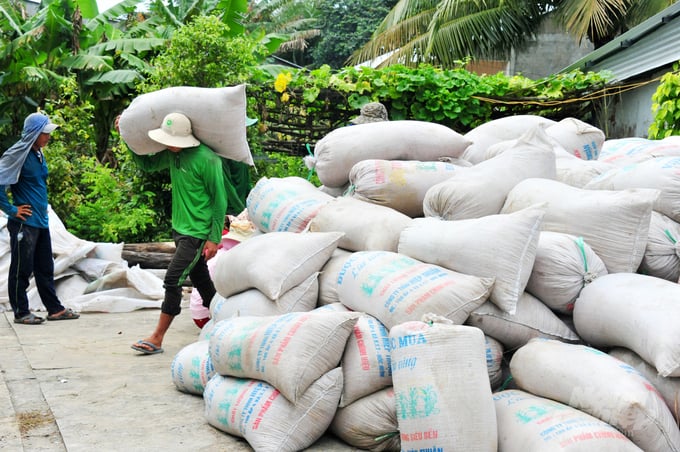
Four years of project implementation has clearly illustrated the importance and effectiveness of the project in sustainable rice production in the Mekong Delta. Photo: Le Hoang Vu.
“In an ongoing effort to promote sustainable farming practices in Vietnam, Olam Agri, GIZ will continue to work with the Vietnamese government to train farmers in modern farming techniques, land resources protection and supporting women in agriculture”, emphasized Mr. German Mueller, MSVC Project Manager, GIZ.
10,000 farmers in the Mekong Delta increased their income by 17% through the public-private partnership project between Olam Agri, GIZ and the Ministry of Agriculture and Rural Development. Farmers participating in the project's demonstration model have reduced water use by up to 40% and NPK fertilizers by up to 15%. Additionally, rice quality has been upgraded to international standards; and new market opportunities have opened up in the EU, the US and Japan.
Translated by Nguyen Hai Long
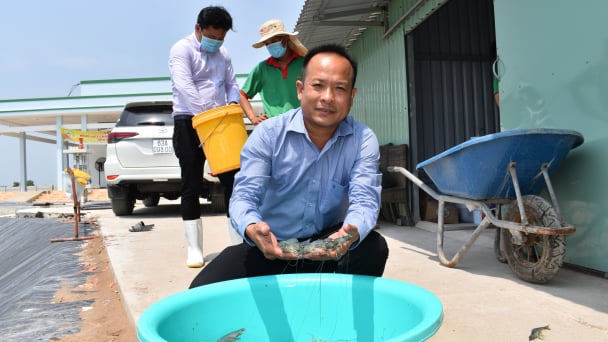
(VAN) One of the key factors for businesses to effectively take advantage of tariff preferences under these FTAs is the rules of origin.
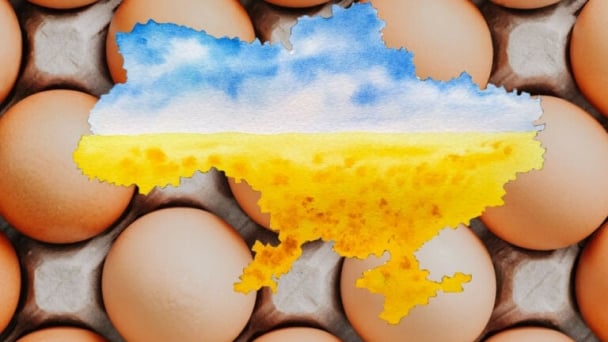
(VAN) Oliyar, a prominent Ukrainian oil and fat manufacturer, has revealed plans to build a farm for 2.3 million laying hens in the Lviv region. The additional production quantities promise to change the competitive landscape of the egg market of the Eastern Europe region.

(VAN) On May 15, Ministry of Agriculture and Environment of Vietnam hosted the 'Connecting Vietnam - Germany agricultural, forestry and fishery trade' seminar in Berlin, Germany.

(VAN) In the face of counterfeit and imitation products, Khanh Hoa Salanganes Nest Company hopes for the prompt completion of the legal framework, strict enforcement against violations, and protection of the bird’s nest brand.

(VAN) Japan's efforts to lower the price of rice through the release of its stockpile may finally be making some progress, albeit at a snail's pace.

(VAN) U.S. tariffs are not only a 'shock', but also an opportunity for Vietnamese businesses to renew their mindset toward comprehensive development.

(VAN) As Bac Giang lychee enters the harvest season, Minister Do Duc Duy expects that the fruit will contribute greatly to agricultural exports due to standardized production and deep processing.